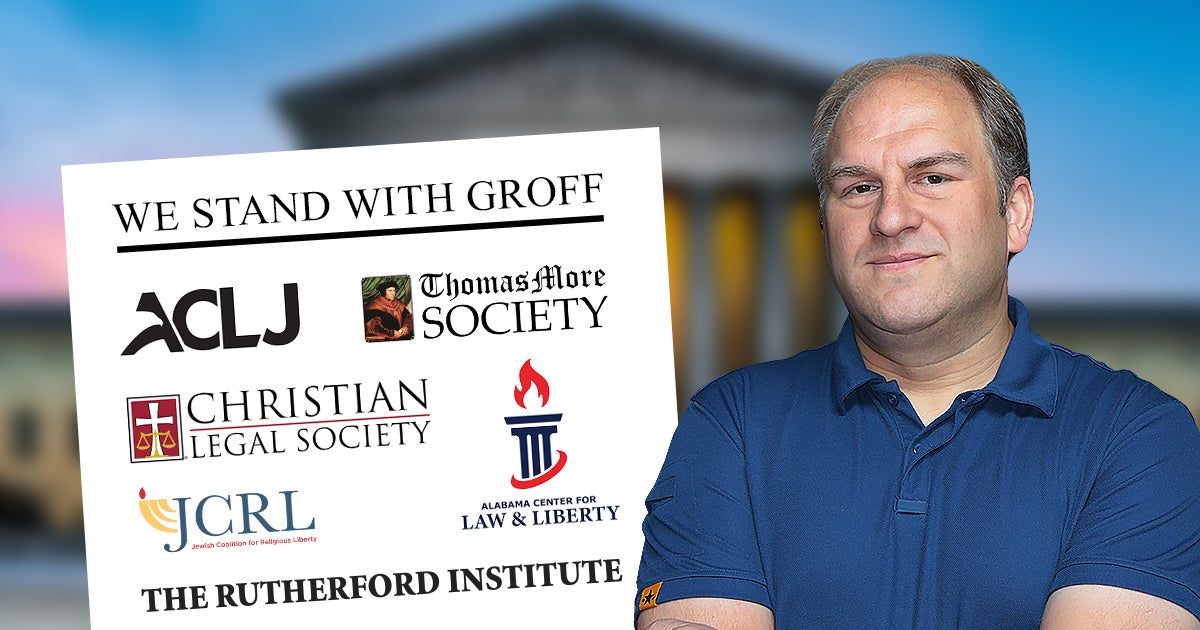
by Jorge Gomez • 6 min read
First Liberty Institute—along with Aaron Streett of Baker Botts, Alan Reinach of the Church State Council, and Randall Wenger of the Independence Law Center—recently asked the U.S. Supreme Court to hear the case of our client, Gerald Groff.
Gerald is a former U.S. Postal Service (USPS) employee who was forced to quit because of his religious beliefs. He strongly believes in observing the Sunday Sabbath. Working for the postal service seemed like a perfect fit—until they began Sunday deliveries. USPS refused to grant him a religious accommodation, which is a direct violation of federal civil rights law.
As the Supreme Court deliberates whether it’ll hear this case, Americans are coming together to support Gerald in this important legal fight.
We’re happy to announce that 14 friend-of-the-court (amicus) briefs have been filed at the nation’s highest court supporting Gerald’s case. A diverse coalition of major national organizations and leaders are taking a stand for his rights, including:
This broad showing of support for Gerald highlights just how vital this case is for religious liberty in America.
During the previous Supreme Court term, 11 amicus briefs were filed in First Liberty’s Treat Children Fairly case (Carson v. Makin) at this stage of the legal process. A total of 10 amicus briefs were filed in our Coach Kennedy case (Kennedy v. Bremerton School District). That many briefs for each of those cases was a tremendous display of support. Those cases resulted in major decisions that had a positive, rippling effect for the freedom and rights of thousands of parents, students, religious schools, teachers, coaches and public employees across the country.
With this many amicus briefs filed in Gerald’s case, it’s clear that many Americans recognize the huge implications it could have for every religious person in the workplace. A ruling in his favor would impact the rights of employees nationwide and possibly set a precedent to stop the toxic “cancel culture” that continually threatens the livelihoods of people of faith.
State Attorneys General, for example, argue that this case presents an “ideal opportunity” for the Supreme Court to correct a legal test that has made it more difficult for people of faith to request reasonable, religious accommodations at work. Their brief explains that a Supreme Court precedent from the 1970s (Trans World Airlines, Inc. v. Hardison) has led to “disregard for believers seeking workplace accommodations.” They add that it is a “dismissive approach” that “cuts against the States’ longstanding interests in safeguarding the country’s tradition of religious liberty.” Their brief doesn’t mince words:
“When Congress passed Title VII of the Civil Rights Act of 1964, it aimed to take career sacrifices for the sake of religious practice off the board…Religious liberty should not fall away whenever its respect costs employers a few dollars and cents.”
Similarly, The National Jewish Commission on Law and Public Affairs and several prominent Jewish organizations argue in their brief that the current legal test “perpetrates great injustice and harm” on Christians like Gerald who observe the Sabbath on Sunday, as well as on people of all faiths in America’s workforce. The brief submitted by members of Congress asks the Supreme Court “to correct its error before any more persons of faith, like Gerald Groff, are forced to decide between their job and their God.”
Whether it’s in the boardroom of corporate America or the woke ideologies that have infiltrated many of our government agencies, there’s growing intolerance and hostility toward religion. People of faith are often put in the untenable position of choosing between their work or their beliefs.
It’s wrong and outrageous to force Americans to choose between their faith and their job. They should not have to face that difficult choice. During this time of extreme “woke” corporatism, a win for Gerald could bring tremendous relief to millions of people of faith facing employment discrimination. The legal issues in this case could impact every religious person and their legal protections in the workplace.
Together, we must protect the rights of every American, like Gerald, to practice their faith without fear of losing their job. Please give today and First Liberty in the fight to deliver more critical victories that safeguard your rights—and the rights of your children and grandchildren—at work.